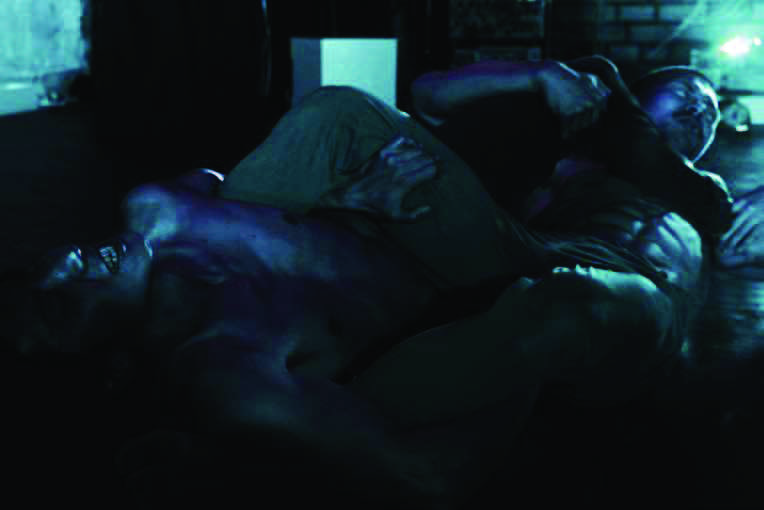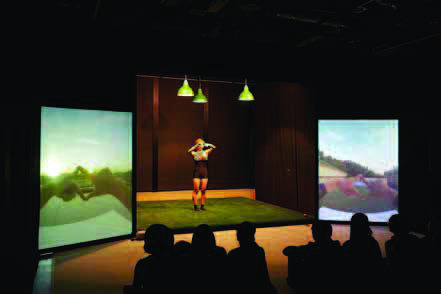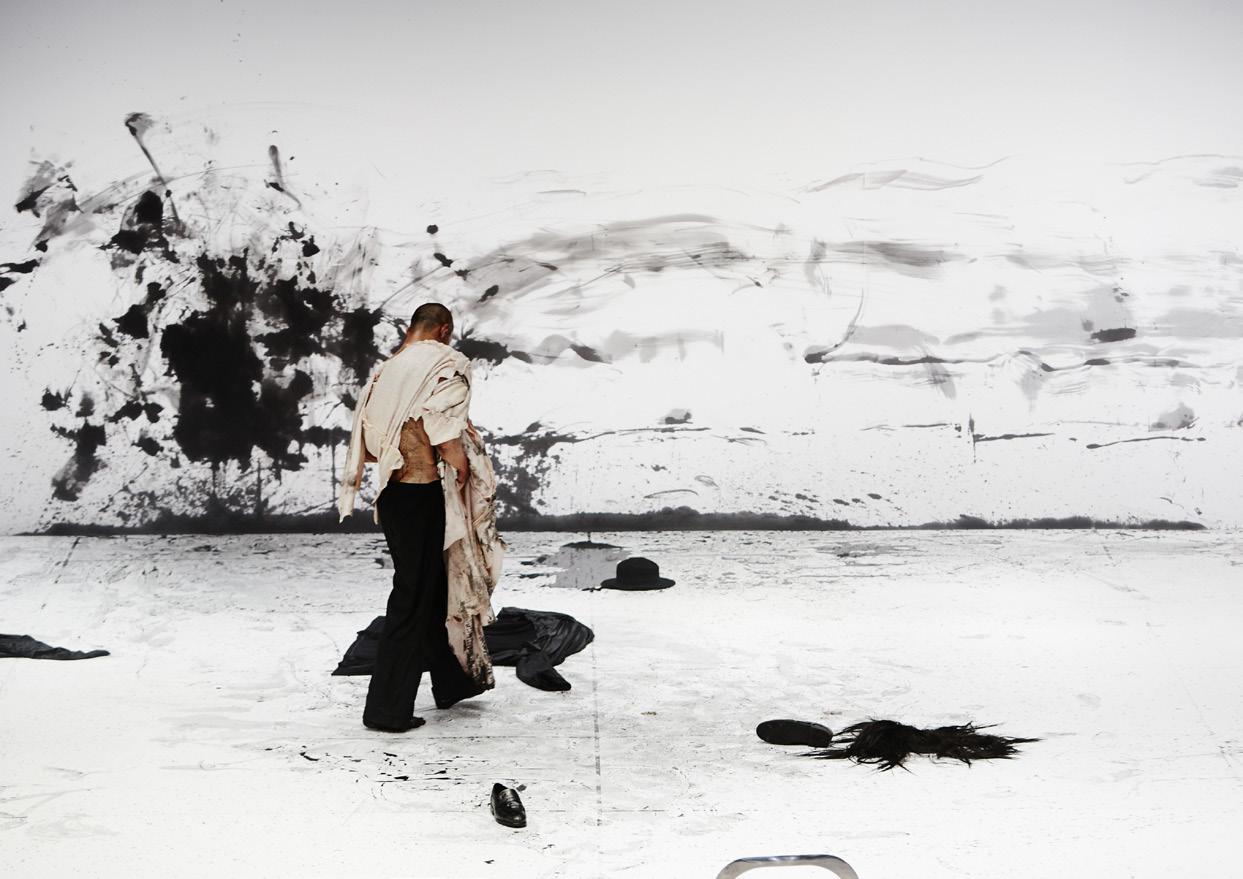Performance Info
YOON Subby (Theatre director. Artistic director of the theatre company Yulhyul Arts Group)
: Posthumanists fighting against old-time theatre
When was Yulhyul Arts Group established?
The timing of its establishment is important. I formed a creative group with some art colleagues at the turn of the century from 1999 to 2000. Therefore, arts combining the concept of ’future’ and the entity of ’present’ was a hot issue in this period. Anyway, we started working on a ’performance’ and tried to give a name to our team for fun. As a result, we came up with the name ’ Yulhyul Arts Group.‘ While making fun of ’unrefined art only full of passion’ implicitly, we ironically chose this name to show how sophisticated the arts we pursue was.
We are curious about your earlier work.
In early days, I liked collaborating with a diversity of people in the fields of music, dance, film and fine arts. In other words, I was interested in a mixture of genres, multidisciplinary genre, crossover and so on. KIM Woo Ok, theatre director as well as director of the School of Drama, Korea National University of Arts, and YOO Duk Hyung, theatre director as well as visiting professor influenced me a lot. Collaborations with colleagues in different genres made me focus more on the form than the content.
You have often presented performances in specific places.
I thought theatre was kind of fake. And I wanted to find something more real. So I went out into the street. The productions from site-specific theatre Romeo N Juliet (2004) to site-specific theatre Oedipus (2007) were large-scale pieces at that time. Something more real and more like a movie was important to me. But I started to doubt if such a work was real and I became less interested in it from that moment.
There are some turning points in your work. What are the reasons for that?
I was satisfied with my work using a variety of media and finding places. However, the problem was the outdated way of thinking. Such an idea came to mind
while reading the book What Is Your Dangerous Idea? written by John Brockman. It is said that the book deals with the ideas that the intellectuals living in the 21st century might have thought of. But I was shocked because it didn’t apply to me at all. For example, the experiment by a neuroscientist showed a result that action came before intention. Then suddenly, I came to see my previous works analyzing the ’motive’, ’intention’ and ’action’ of the characters in a play from a different angle.
In your ’Unstable’ series, there exists a virtual character to doubt something fake. How has it started?
Unstable series demonstrate an unstable situation transgressing the boundary between acting and non-acting, stage and non-stage as well as pretense and non-pretense. The first series, Unstable ver.01 (2010), appropriates a theatre space as part of the Linkage Project. The second series, Unstable ver.02 - a tale of mermaids (2011), is a performance performed across the city, carrying a large water tank with a mermaid in it. It illuminates how theatrical illusion tells a lie, using the topics of ’heredity’ and ’evolution’. The third work, Unstable ver.03 - a tale of telepathy (2012), delivers a sarcastic message that ’Performers are psychics with telepathic abilities,’ if it is true that ’When performers have sincerity, it will be delivered to the audience.’ This work finally shows that the facts verified by neuroscience don’t support artistic romanticism as a matter of fact.
What do you mean by the word ’unstable‘?
It refers to ’an unstable phenomenon’, rather than an unstable mental state. Things that are not scientifically verified are in conflict with those who believe in them from the heart. What I want to present on stage is the collision as well as the third object to be created by this collision.
Defeat the Robot seems to give advice to the ’humans’ who are stuck in an outdated way of thinking. What made you create this series?
The process of asking questions about theatre, performers and humans through Unstable series brought me to the subject of ’robot’ in the end. As a result, we created a follow-up to the previous series titled Unstable ver.04 - Defeat the Robot (2014). The following year, we gave the new series a new name, Defeat the Robot 2 (2015), for the purpose of continuing its concept, while being separated from Unstable series. This work is based on the discourse of posthumanism, including robots and AI(Artificial Intelligence). The themes of its three series are ’acting’, ’justice’, and ’love’ respectively. It was also influenced by Gordon Craig, who introduced the concept of ’superhuman’ as a main character on the stage instead of performers.
What is posthumanism?
We may think of questions like "To what extent machines become similar to and indistinguishable from humans?" and "From which point can humans not be humans with an infinite extension of humans along with machines?" It is posthumanism that embraces these philosophical discourses. In our performance, robot is a concept representing ’newly emerged human-like’ objects. We call into question the boundary between performers and non-performers, humans and non-humans by presenting animals and robots onstage. Finally, it is an attempt to reflect on the old-time theatre placing ’humans’ on stage and explore the meaning of ’body’ existing on stage alongside the essence of theatre.
How would you describe your working style with performers?
It is basically about endless presentation and discussion. In the cases of Defeat the Robot or Unstable series, I try to regard the relationship between performers and a director as the relationship between artists and a curator. Given a certain subject, individual creators are asked to keep creating short pieces. Based on them, we go through a process of discussing, developing, mixing and recombing the outputs and finally complete a work.
Why do you direct? What does performing arts mean to you?
I like theatre because its scale is small. It is an affordable scale. My work is ultimately aimed at inviting audiences to open discussions. A medium of theatre gives an impression that one can get a chance to speak exclusively during the performance at least.
I have reached a conclusion that 21st century theatre fiercely fights against 20th century humanism. The past is precious. But the future is more precious. The present caught in the past is to be led by the future all the time. Therefore, we have to fight against the past. The best way to treasure the past is to fight and win it eventually.
Production Details
- Director
YOON Subby
Reference
- E-mailthe1075@naver.com








.jpg)



 PREV
PREV
.jpeg)
.jpg)
_(c)포스(FORCE).jpg)
_(c)장석현_코끼리들이 웃는다(SUKHYUN JANG_ELEPHANTS LAUGH).jpg)
.jpg)
.jpg)
_(c)한받(Hahn Vad).jpg)
_(c)비주얼씨어터 꽃(CCOT)(1).jpg)
_(c)봉앤줄 (BONGnJOULE)(1).jpg)
_(c)대한민국연극제 2019 (Korea Theater Festival 2019)(0).jpg)
_(c)몸꼴(Momggol)(1).jpg)
.png)
2018MODAFE_Taemin Cho (2).jpg)











